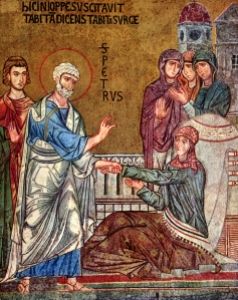Lectionary Sunday – Tabitha – Acts 9:36-43


36 In Joppa there was a disciple named Tabitha (in Greek her name is Dorcas); she was always doing good and helping the poor. 37 About that time she became sick and died, and her body was washed and placed in an upstairs room. (read more)
Tabitha is a fascinating, but little described character, the description that we get of her leaves me with more questions than answers:
- She is a disciple – She’s the only woman called a disciple in the New Testament. Obviously Jesus had women who followed him, what was Tabitha’s role in the church? How long had she been following Jesus?
- She has both a Jewish and a Greek name. She is somewhat bi-cultural then, but why? Was she a Hellenistic Jew? Was she the child of an inter-cultural marriage? Was she a Jewish kid growing up in a Greek Neighborhood? Was she just super adept at code-switching? I don’t know. But she seems to have connections to more than one community and culture.
- She was known for always doing good and helping the poor. What sorts of things did she do for the poor? How many people knew about her good deeds and helping the poor? Were they poor Jews? Greeks? Christians?
- People were impressed by the clothing and robes that she made. Were her robes something that she made to give to the poor? Were they a part of a business that allowed her to support the poor financially? Were they elaborate artistic creations or simple durable clothes?
I want more answers when I read the story of Tabitha. But the story having been written 2000-ish years ago, doesn’t offer more answers, so we are left to pick out the details with the Spirit’s help.
- She is a disciple – We do not know when she became a disciple, how many other women disciples there were or what her exact role was in the church. But we do know that she was a disciple – we have evidence here that studying the teachings of Jesus and modeling the life of Jesus was not just the role of men. That is good news for women and girls in the church (and good news for men and boys too who don’t have to carry the burden of studying and leading and imitating Christ without the benefit of half of humanity)
- She is bi-cultural. She can navigate life in two different worlds. We don’t know the circumstances of her bi-cultural nature, but as our world becomes increasingly diverse, “doing good and helping the poor,” will require more and more cross-cultural competency. This is also good news for many 3rd Culture kids, who never feel fully at home in Culture A or Culture B. There is room for a little Culture A and a little Culture B in the culture of the Kingdom.
- She is known for doing good and helping the poor. Tabitha is not just a disciple who studied Jesus, she is a disciple who lived Jesus. Like Peter (who God uses to raise her from the dead), Tabitha is doing the things that Jesus did. Whether she saw those things in action first hand, or is learning them through the stories of the other disciples, Tabitha is becoming what she learns.
- She made impressive robes and clothes. We don’t know if it was because these robes were remarkably well made and durable basic work clothes, or if they were elaborately embroidered pieces for special occasions. But we do know that what she did was excellent and well regarded. This is a part of our call, a part of being the good news and like Tabitha, living what we study in Jesus.

The question I have for you is this – how will you live Jesus this week? Is it an example from Tabitha’s life, or something different?